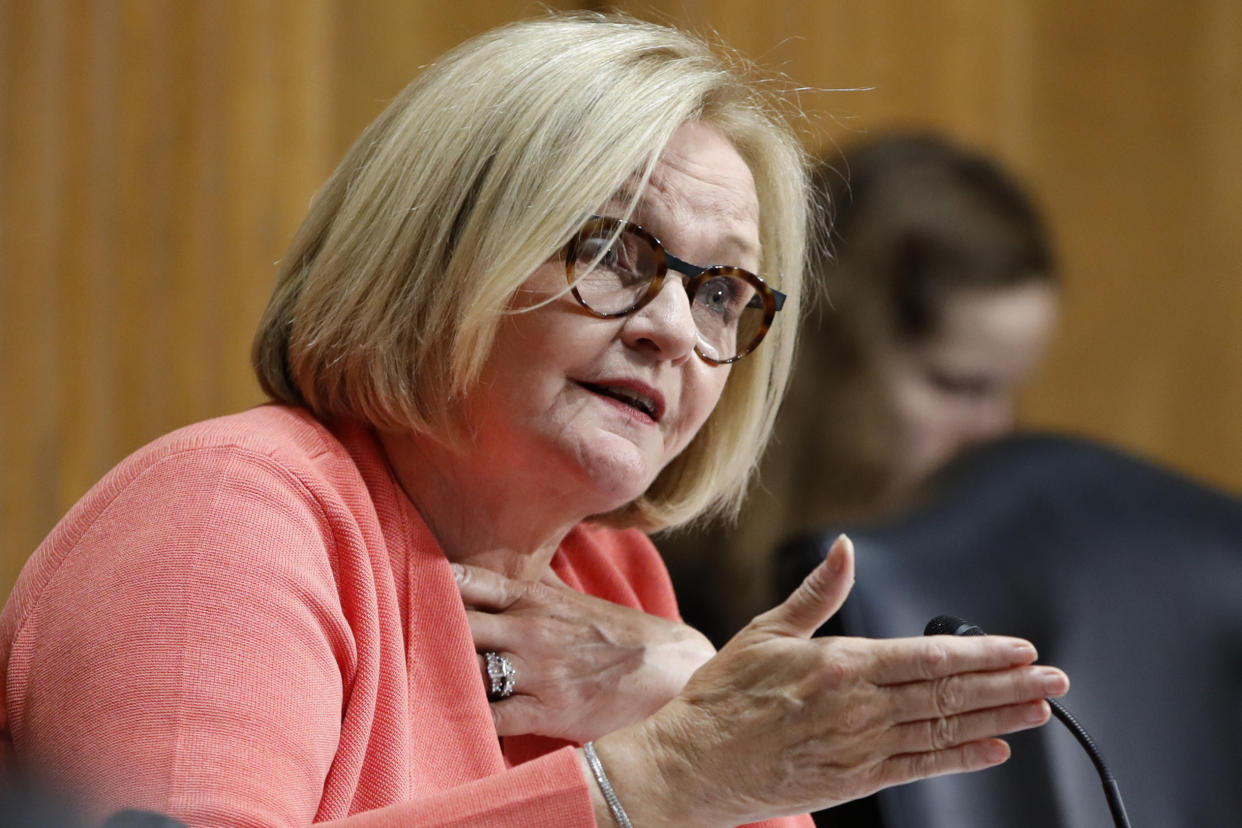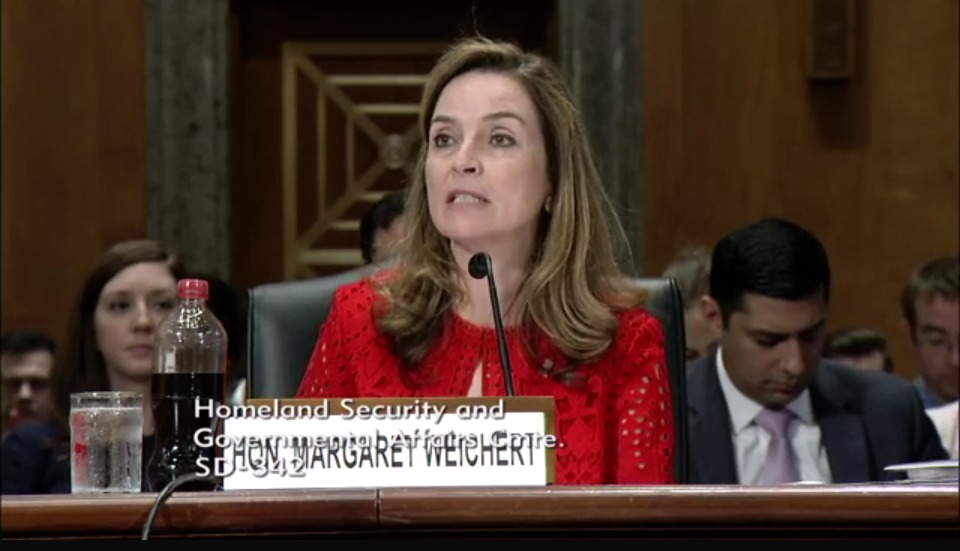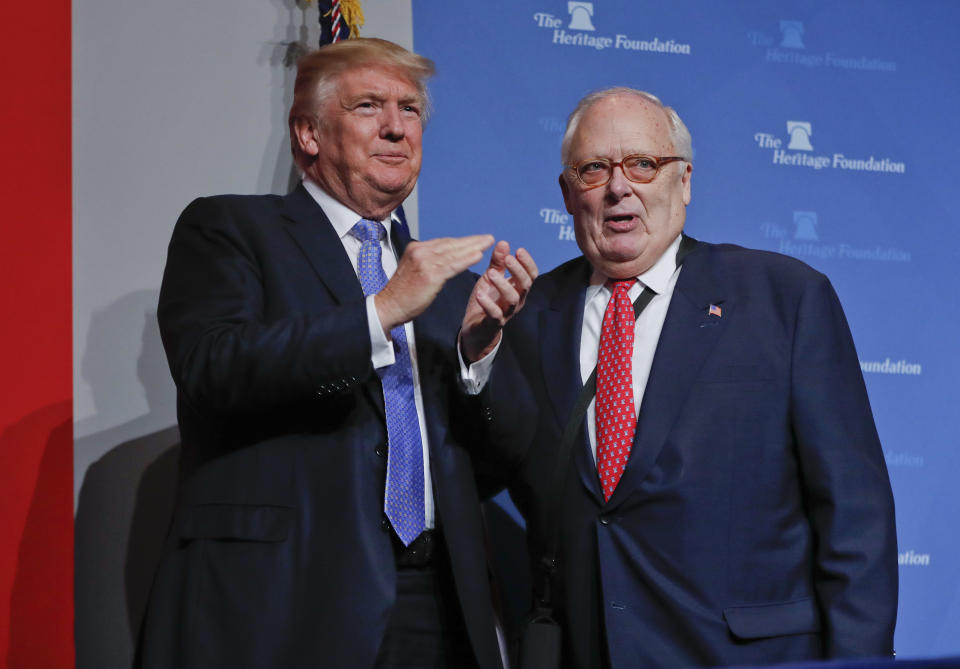Democrats sound alarm over Trump's plan to slash the federal government

- Oops!Something went wrong.Please try again later.
WASHINGTON — A congressional hearing on reforming the federal bureaucracy devolved into rancor on Wednesday morning, with some Democrats charging that the Trump administration is trying to privatize essential government functions, including the U.S. Postal Service, without compelling reasons to do so.
In one particularly tense exchange, Sen. Claire McCaskill, D-Mo., sharply interrupted the sole witness testifying before the Senate Committee on Homeland Security and Governmental Affairs, Margaret Weichert, a high-ranking deputy at the Office of Management and Budget, after having grown exasperated by what she saw as Weichert’s evasive answers.
“Well, you’re not gonna get very far if you don’t give us the data,” a visibly frustrated McCaskill cautioned. “I’m just telling you. It’s not gonna happen.”
President Trump first proposed reorganizing the federal government less than two months after taking office. In an executive order signed on March 13, 2017, Trump directed OMB to “propose a plan to reorganize governmental functions and eliminate unnecessary agencies.”
That plan was released last month, and it includes several controversial proposals among its 32 “alignment priorities,” among them combining the Department of Labor with the Department of Education, moving the Supplemental Nutrition Assistance Program, commonly known as food stamps, under the purview of the Department of Health and Human Services and, perhaps most controversial, turning over the Postal Service to private management.
Wednesday offered the Trump administration a chance to tout its progress to legislators. And though committee Chairman Ron Johnson, R-Wis., opened the hearing gamely, asking members of the audience if they thought the federal government was hopelessly unwieldly (most agreed it was), the mood darkened with McCaskill’s intense criticism of a process she described as opaque and impervious to the necessary scrutiny of Congress.

Weichert defended herself from the attacks. A former high-ranking executive at Ernst & Young and other corporations, she had not held a government position until her 2017 nomination to the OMB, where she is now the deputy director for management. She cast herself as a seasoned executive who could bring the sprawling federal apparatus — 430 separate departments, 2.79 million employees, a budget of $4.4 trillion — under some measure of control.
“I cringe when I hear how inefficient it is for Americans to interact with their government due to layers of organization bureaucracy. This is not how Americans want their government to operate,” Weichert said. At one point, she described her task by borrowing an acronym used by Sen. James Lankford, R-Okla.: BHAG, which stands for “big hairy audacious goal.”
But she could not erase Democrats’ memories of onetime White House political strategist Stephen K. Bannon promising a “deconstruction of the administrative state,” or of Trump’s well-known animosity to a bureaucracy he believes is rife with “deep state” enemies of his administration.
During the presidential campaign, Trump suggested he might entirely eliminate the Environmental Protection Agency and the Department of Education. And many agencies are so severely understaffed that the White House recently resorted to a job fair to attract federal employees.
It was thus understandable that suspicions ran high on Wednesday. “I’m worried about a sledgehammer coming in,” said Doug Jones, D-Ala.
Maggie Hassan, D-N.H., echoed the worries of liberals who believe that a “consolidation” of the Labor and Education Departments would be nothing more than a means to vitiate both. “This administration has a track record of chipping away at workers’ protections,” Hassan said. “Students and workers will presumably be left with no champion” if the two departments are combined and allegedly redundant programs are eliminated, Hassan added.

And while Weichert expressed no overt political ideology, presenting herself as a capable technocrat, she could not escape the fact that conservative groups have long advocated for reducing the scope of the federal government. “We know a lot of these came from Heritage,” McCaskill said bitterly, referencing the conservative Heritage Foundation. “They gave us our Supreme Court nominees, they now are giving us government proposals. We have a right to know where these proposals came from.” (The Heritage Foundation provided the Trump campaign with a list of conservative jurists, and both of Trump’s nominees to the Supreme Court have come from that roster.)
Greg Scott, a Heritage Foundation spokesman, told Yahoo News that the think tank is “pleased that lawmakers from both sides of the aisle recognize the Heritage Foundation for our effective work advocating for sound conservative ideas in numerous policy areas.”
An administration official disputed the characterization of the OMB plan as a Heritage brainchild. “The claim that this is a Heritage plan is a disservice to our dedicated career civil servants,” he said, “who spent a year combing through public [Government Accountability Office] and [inspector general] reports, as well as citizen submissions, in order to craft a proposal that would help make the federal government more efficient, effective and accountable.”
Trump is certainly not the first president to attempt a taming of the bureuacratic beast. Back in 1993, President Bill Clinton promised a federal government that “puts a premium on speed and function and service, not rules and regulations.” Nineteen years later, Obama vowed to “make our government leaner, smarter and more consumer-friendly.” If those efforts had been successful, there would be little left for Trump to reorganize.
Just how much Trump can accomplish is unclear. Thought Weichert asserted that there were some dozen proposals that the administration intended to act on unilaterally, she did not say what those proposals were, or when they would be implemented. Norman J. Ornstein, a congressional expert at the libertarian American Enterprise Institute, told Yahoo News that “most of what they are trying to do — moving major programs, altering and renaming departments — can’t be done without Congress. And there is no way Congress will agree — including, for example, Republicans on the agricultural committees, but also all Democrats in the Senate.” That could leave this reorganization as imperiled as its predecessors.
As the mood in the hearing room soured, Johnson, the Wisconsin Republican, bemoaned the partisan rancor that he viewed as having been instigated by McCaskill. He also defended Weichert, arguing that the reorganization plan was still in its early stages. McCaskill was not mollified and wondered what the purpose of a congressional hearing was if not to ask difficult questions.
Max Stier, chief executive of the Partnership for Public Service, had previously praised Weichert’s hiring, but on Wednesday he voiced support for congressional oversight of her work. “Congress plays an essential role in evaluating the administration’s reorganization proposal,” Stier told Yahoo News. “Today’s hearing was an important step in helping Congress better understand the administration’s plan and assess its impact on the American people. It is imperative that the congressional committees of jurisdiction have access to the information they need and exercise their oversight responsibilities in shaping federal agencies and programs.”
For all the discord, nobody present at Wednesday’s hearing dared describe the federal government as a model of efficiency. Something needs to be done, but as is frequently the case in Washington, there is little agreement on what that should be or who should pay for it. “We have multiple government agencies that oversee catfish,” said Sen. Gary Peters, D-Mich. “I don’t think we need that. I want them to have one agency to make sure catfish is safe when I eat it.” In this age of incessant rancor, catfish safety may be the best Congress can do.
_____
Read more from Yahoo News:
Ex-NSA official: Russian hack of Democrats was ‘assembly line operation’
Brett Kavanaugh’s ex-boss: It’s ‘preposterous’ to demand his recusal from Mueller cases
‘I thought I would never see him’: Asylum seeker and son reunite after border separation
After Trump’s defense of Putin, sighs of resignation — but nobody’s resigning (yet)
Trump and Putin: The admiration is mutual, the benefits one-sided



